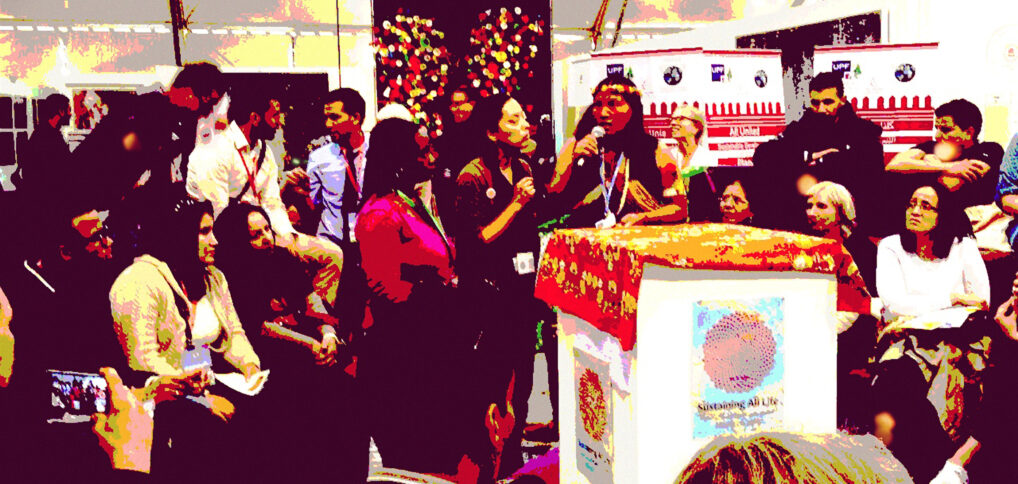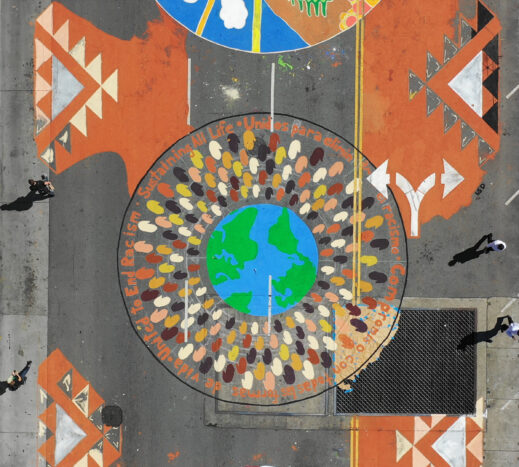
View this resource
in English (PDF) >>
****
View this resource
in Arabic>>
****
View this resource
in Dutch >>
****
View this resource
in Hindi >>
****
View this resource
in French>>
****
View this resource
in German >>
****
View this resource
in Spanish >>
Our perspective
We will back Indigenous existence and leadership. Peoples throughout the world need to do whatever is necessary to heal the effects of all past and current genocidal policies that have been enforced on Indigenous peoples. We stand against and are committed to ending all policies of genocide in the present. We will remove any barriers to learning from, supporting, and following the leadership of Indigenous people, whose lands we all occupy and use resources from.
Caring for the earth, treaties, and indigenous sovereignty
Caring for the earth, honoring treaties with Indigenous peoples, and Native Sovereignty are deeply intertwined. Native peoples do not compartmentalize these things. They are seen as the same issue.
Challenging our cultural worldviews

Most of us have been raised in cultures that condition us to view the world through the lens of constant battles for dominance and exploitation. If we are not dominating the situation in which we find ourselves, we may feel like we are either being ignored or forced to submit to someone else’s dominance.
We may feel that ownership of “private property” gives us the right to exploit “our” property, however we see fit. Many Indigenous peoples do not believe that Mother Earth can be owned. The land is held in common by the Tribe and cared for to sustain humans, other species, and habitat for current and future generations.
Many non-Indigenous peoples are acculturated to see much of life as a battle between good and bad. This worldview has often been harshly enforced by punishment or threats of punishment—in this worldview, what is bad must be punished. Punishment has been institutionalized by “criminal justice” systems. Even if we are philosophically opposed to this worldview and these institutions, they may still affect us on an unaware level; for example, we may vehemently wish for environmental wrongdoers to be punished for their misdeeds. These feelings are understandable, but in general they reflect a non-Indigenous worldview.
On the other hand, many Indigenous people have been exposed to and/or immersed in a different set of cultural perspectives from the above. The opportunity to listen to, respect, and absorb these different perspectives is a gift to everyone. For example, while a non-Indigenous person may think first and foremost about the dichotomy of right versus wrong, an Indigenous person may be more focused on whether things are in harmonious balance and be concerned with how best to restore balance and harmony.
Of course, there are many different Indigenous cultures, and hence many different sets of cultural values that can inform everyone about reality. Unfortunately, at this point many Indigenous cultures have been profoundly affected or distorted by colonization—for example, the systematic imposition of non-Indigenous religious beliefs and practices on Indigenous peoples, and the cultural norms imposed by the dominant culture’s educational institutions. It is therefore important to be aware of the effects of colonization on Indigenous cultures and people.
Learning to respect indigenous leadership styles

Many Indigenous people have survived genocide by hiding, by avoiding standing out too much in non-Indigenous settings. At the same time, many non-Indigenous people have received subtle training not to notice the presence or influence of Indigenous people—in effect, to “disappear” them even when they are sitting in the same room. This dynamic is a result of the history of genocide and can show up in several different ways. An Indigenous person who is a visible leader in a non-Indigenous setting, for example, may feel too much fear to easily radiate confidence. And all too often, an Indigenous person may make an intelligent proposal that is almost completely ignored but later restated by a non-Indigenous person who gets credit for making the proposal. Further, Indigenous leaders may not forcefully dominate groups in the ways we have come to expect of “powerful” non-Indigenous leaders. It is very important that all participants learn to be quiet, listen respectfully, and give Indigenous leaders room to occupy leadership space in whatever way they choose without imposing non-Indigenous agendas or feelings of urgency about environmental issues.
Things to learn
The 2016-2018 battles against construction of the Dakota Access oil Pipeline around the Standing Rock Indian Reservation in the United States were deeply significant, and not just as a protest movement. Standing Rock exposed the face of modern genocidal policies and warfare. Standing Rock mobilized Indigenous resistance to an act of war waged against Indigenous people by corporate interests that were supported by U.S. Federal and state governmental policies. Non-Indigenous owning class interests were pitted against Native interests and treaty agreements. At Standing Rock, there was a broad inter-tribal gathering and standoff to defend Indigenous land and water rights for the benefit of all people.
It is important and useful to become familiar with the treaties that have been signed by the government and local tribe(s) in the geographical area in which you are working. Many of these treaties are violated daily by non-Indigenous people who ignore the continued existence of Indigenous people, and who do not believe that Indigenous land and resource rights have any merit. Such attitudes constitute ongoing active genocide toward Indigenous people with an ultimate goal of seizure and privatization of land. Many excuses are used to justify these attitudes.
If you live in the United States, it is helpful to learn what the following words mean in relationship to non-Natives and Native Americans: ceded land, Native sovereignty, self-determination, allotment, assimilation, Indian reorganization, tribal termination, annuity payments, usufructuary rights, federal recognition, Indian Boarding Schools, Bureau of Indian Affairs (BIA). These terms refer to policies and issues that are closely linked to the ongoing genocide of Indigenous North Americans.
If you live outside the United States, it is a good idea to learn how the laws and institutions in your country affect Indigenous peoples.
Building relationships
Much of the work of ending genocide hinges upon our ability to build genuine friendships relationships with Indigenous people. If this is a struggle for you, it may make sense to start by building friendships with people who have Indigenous heritage but were raised in a culture similar to yours (for example, people with Native heritage who were raised in a white, Black, or Latino/a cultural setting). In these relationships, you can explore and begin to understand the Indigenous parts of their heritage and learn to recognize the effects of genocide on them. They may be enough like you that you will feel relatively comfortable with them; this is why they may be a good place to start. But their family stories may be quite different from yours, and their strengths and difficulties may not be identical to yours.


